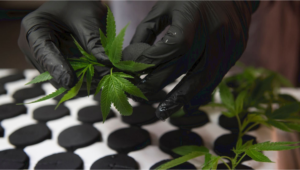The prohibition on cannabis has done nothing to stop the general population from smoking weed, but has legalization brought on the benefits that were expected?

Recreational cannabis legalization first became a reality in the USA way back in 2012, with both Colorado and Washington becoming the first states to make the switch. At the time, there were a bunch of advantages that were cited as reasoning behind the decision to let the population vote on whether to end the prohibition and allow consenting adults the choice on whether they wanted to legally consume cannabis.
In addition to its anti-nausea effects, cannabis has been shown to have a range of potential health benefits. It can help alleviate chronic pain, reduce inflammation, and improve sleep.
At the time of writing, the number of recreational legal states now sits at 18 with medically legal states now at 37. There have also been recent moves at the federal level to make cannabis legal country-wide, with the House of Representatives recently passing a bill to federally decriminalize marijuana, that way anybody who has been charged with something regarding marijuana can now seek help from a criminal defense lawyer.
WHAT ARE THE MAIN BENEFITS OF LEGALIZING THE RECREATIONAL CONSUMPTION OF WEED?
1. Cannabis Legalization Provides a Massive Boost to the Local, State, and Federal Economy
A 2018 report from the Federal Reserve Bank of Kansas City stated that Colorado brings in over three times the tax revenue from recreational cannabis as it does from alcohol, with over $78 million in the first financial year after starting retail sales, and over $129 million the second fiscal year. That number exceeded $396 million in 2021, and that’s just in Colorado. In California, 2021 marijuana tax revenue was almost $1.3 billion.
2. Legalization Leads to a Drop in Underage Usage and a Drop in Overall Crime in the Area
With legalization comes education, regulation, and extra scrutiny. Even though recreationally legal areas have a rise in shops that provide cannabis to the general public, these vendors are highly regulated. In a study by Washington University, researchers found that rates of consumption by 14 to 15-year-olds dropped from 9.8% to 7.3% in 2014/2016.
Crime rates in areas where recreational dispensaries are present have also been proven to drop quite significantly. Studies point to the fact that the population tends to consume less alcohol when legal weed is available, which unsurprisingly seems to directly correlate with a sharp drop in crime. Individuals who are charged with a drug-related offense may need to hire a criminal defense attorney to build their defense strategy.
3. It Frees Up Police Resources and Ends the Costly and Unnecessary Enforcement of Cannabis Laws
Jeffrey Miron, a leading Harvard University economist, has been quoted as predicting that up to $13.7 billion annually could be saved just by the end of cannabis prohibition enforcement.
This also frees up police, allowing them to focus on more serious crimes like violent offenses and sexual assault.
4. Cannabis Legalization Would Put an End to Inherently Racist Policies
People of color have a much higher chance of being arrested and prosecuted, even though the rates of usage are almost identical with both the white and black populations. In the USA, a person of color has a 3.7 times higher likelihood of being arrested than a white person on cannabis charges.
Other supporting arguments for cannabis legalization are:
- Legal cannabis is regulated, which makes it safer for consumers and allows consumers to access much more information on the product.
- DUIs decrease.
- It restricts the flow of money through the black market and into the hands of cartels.
- It has less harmful health impacts than alcohol and tobacco, both of which are fully legal.
- It creates a vast number of jobs.
- Governments do not have the right to tell adults what they can and can’t consume.
Are there downsides to recreational cannabis legalization?
Sure, every policy change comes with downsides, but in this case, the advantages outweigh the cons so heavily that it really makes zero sense to not make the switch.